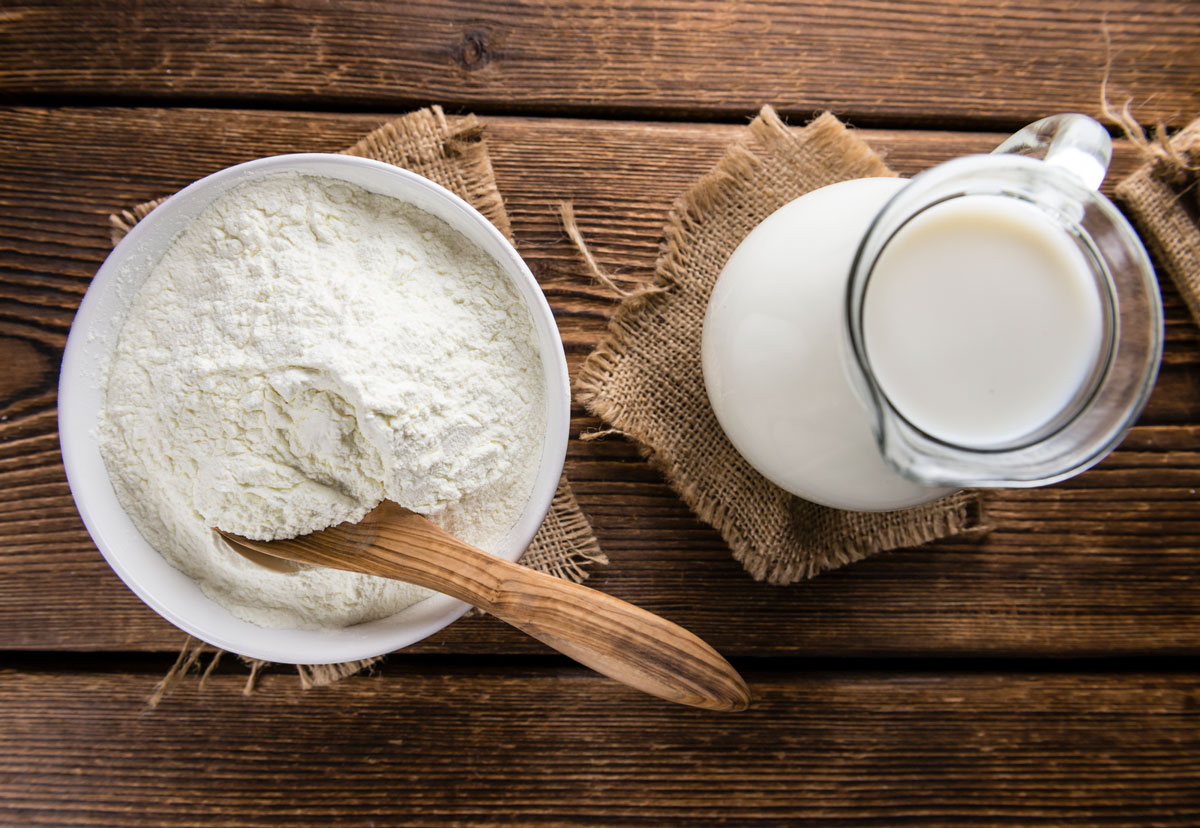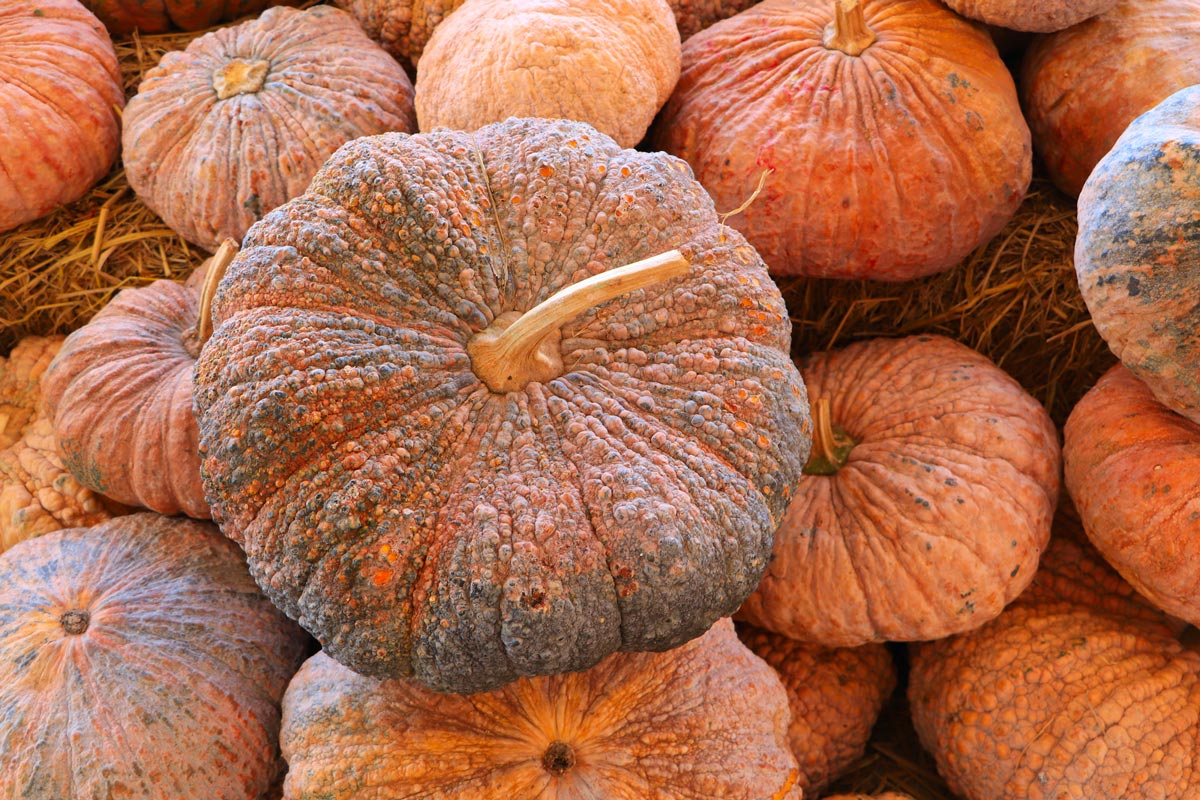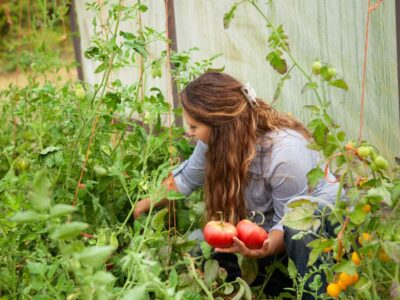This is your ultimate guide to preserving milk, cheese, eggs, and meat. We’ll cover the different options for preserving these products as well as safety concerns and guidelines to follow. Plus which is the best option, based on the end product and how you plan on eating it!
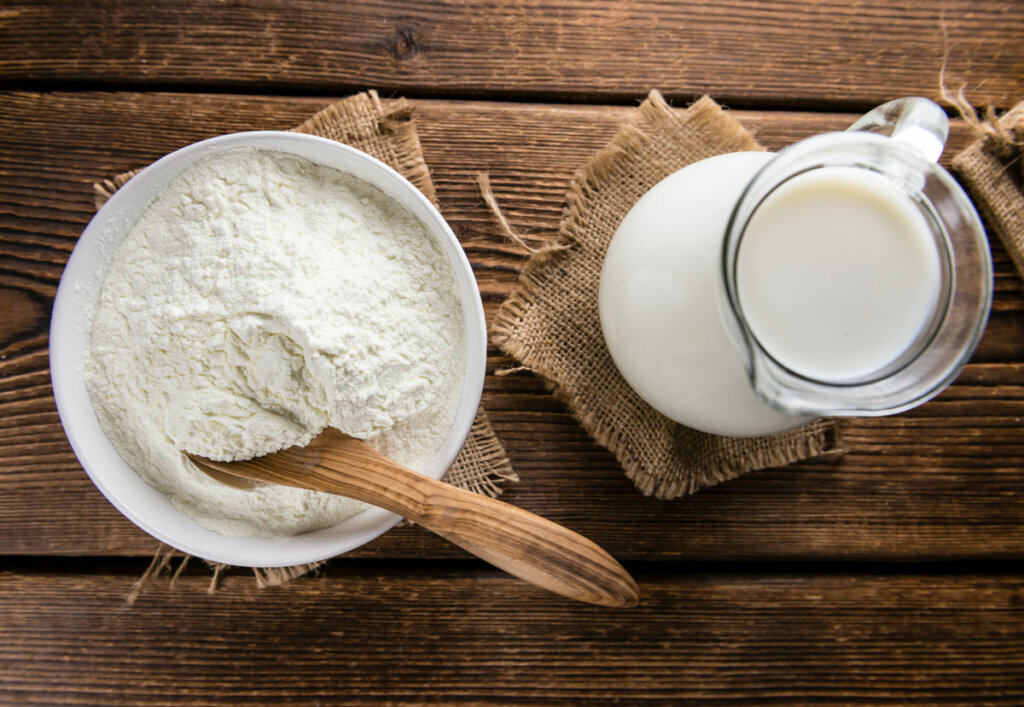
This is the Pioneering Today Podcast, episode #314! For this episode, I’m taking a deep look into our home food preservation and learning ways to improve or go deeper into my skills.
We grow 60-70% of our own fruits and vegetables on our homestead (grab my free charts to help you know how much food to grow per person per year here), and that includes preserving that food to use throughout the whole year in ways that work for our family and our food preferences.
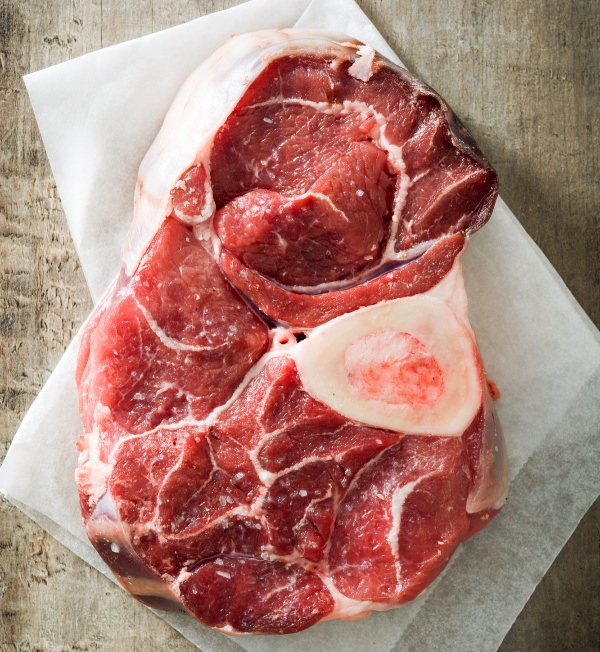
We also raise 99% of our own meat each year. The 1% we purchase comes in items like the little bit of bacon I buy when ours runs out, a few packages of skinless, boneless chicken breasts I need for specific recipes, and the occasional chicken wings!
Because of this, we’re very reliant on the deep freezer, the regular freezer, or canning to ensure we don’t run out of food before the preserving season the following year.
I recently received a freeze dryer and have been testing out more methods of food preservation, most specifically in regards to preserving eggs, meat, and dairy products.
If you find yourself needing to find better methods for preserving these foods, today’s podcast is for you as I’m going to take a deep dive into the various preservation methods, and which methods I think are best for each category.
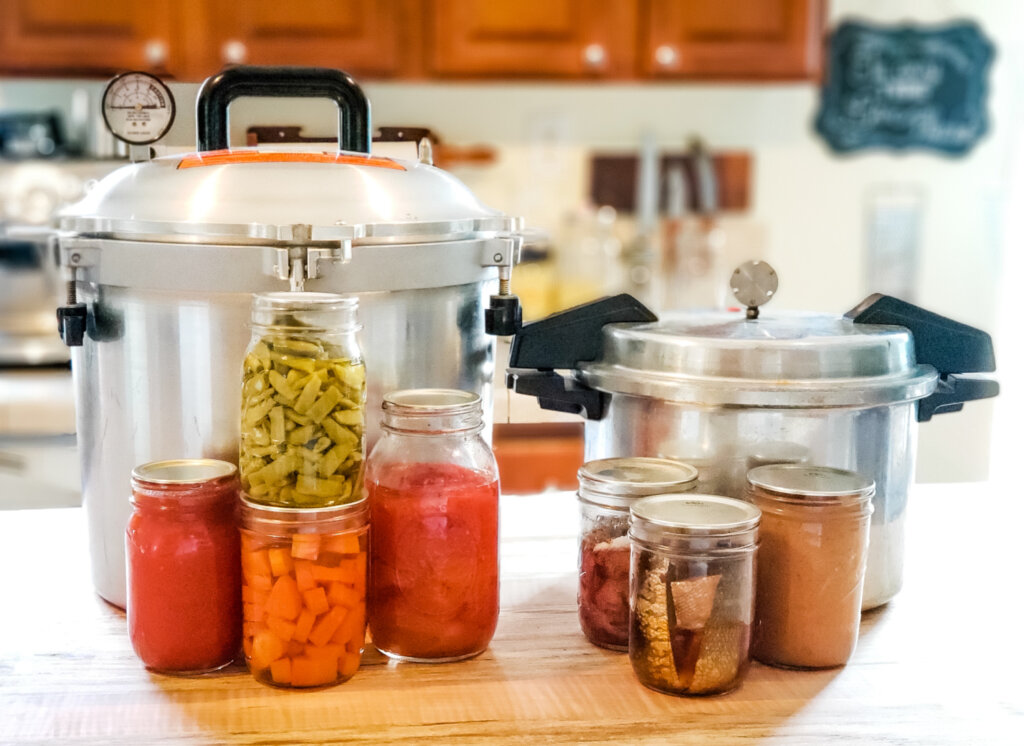
🍞 Struggling With Sourdough?
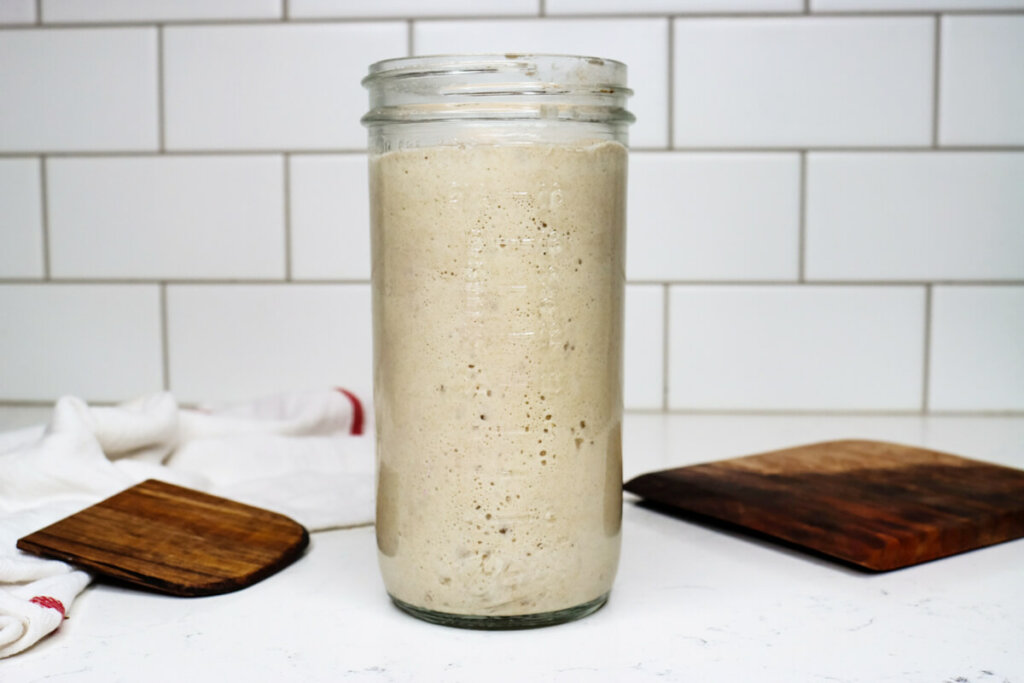
If your starter won’t take off, your loaves are dense and hard, or sourdough just flat-out overwhelms you…
👉 I’ll show you how to fix all of it.
Join my FREE workshop and learn how to make a bubbly, active starter—the right way, from Day One.
Table of Contents[Hide][Show]
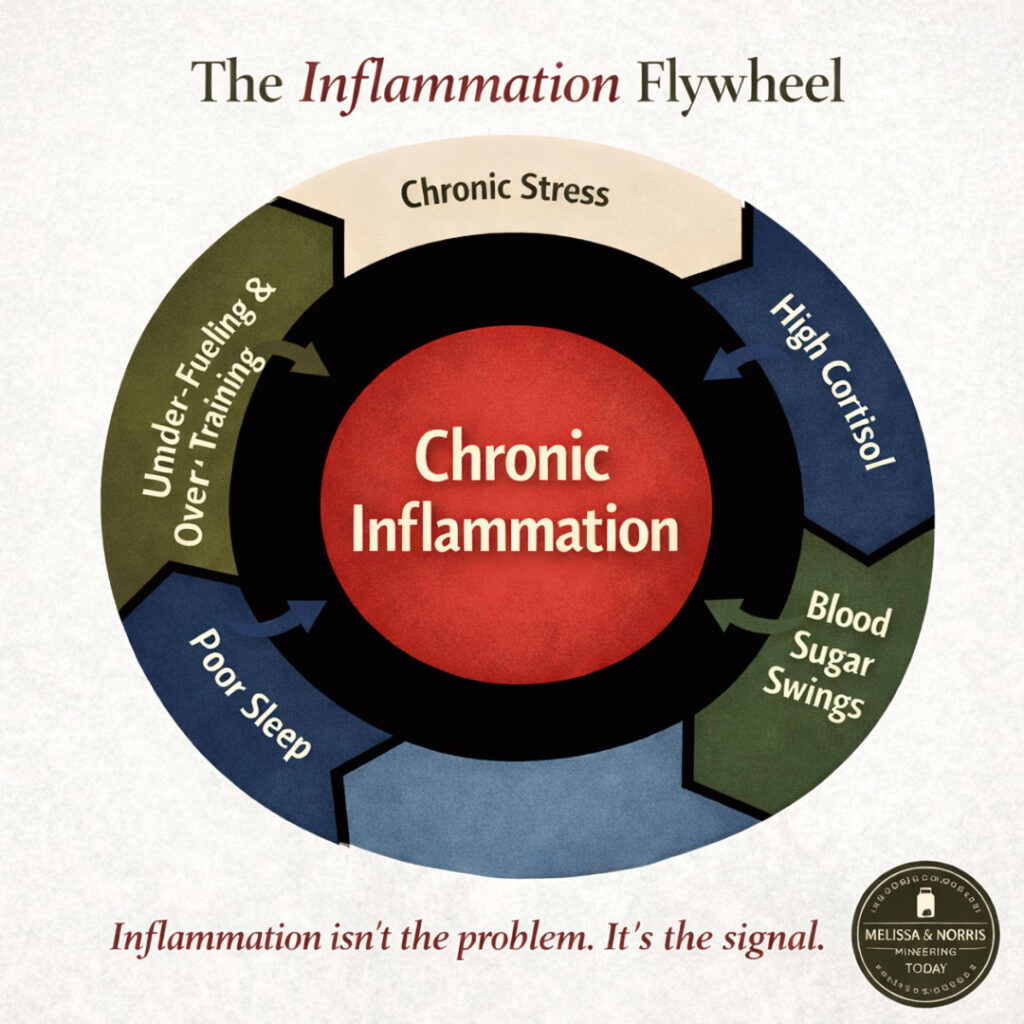
The Hidden Cycle Keeping You Inflamed
If you’ve been feeling puffy, tired, achy, or wired-but-tired, this two-page guide will help you understand what may be happening behind the scenes — even if you’re eating “healthy.”
Download the Inflammation Flywheel Guide and learn:
- Where to start so you don’t feel overwhelmed
- The 5 most common drivers that keep inflammation switched on
- Why blood sugar swings, stress, and poor sleep feed each other
Which Preservation Method is Best?
I always like to tell people, before they decide on a specific preservation method, to test a small batch first. There’s nothing worse than spending your hard-earned time on a method that gives unfavorable results or a product that you’re not excited about using.
Here are the basic forms of preservation:
- Canning (Water Bath)
- Pressure Canning
- Dehydrating
- Fermenting or Culturing
- Freeze Drying (which I’m just getting started with myself)
I also recommend thinking about the way your family uses each product on a regular basis. Do you like drinking fresh milk or having milk for your coffee or breakfast? Then perhaps freezing or freeze-drying milk is the best option (although for flavor and texture, I’d recommend freeze-drying).
Do you mainly enjoy fresh eggs fried up in a pan? Then using cold storage to keep your eggs fresh for a few months might work well, or perhaps you’d like to try the limed egg solution to keep them fresh for up to a year.
However, if you just need eggs for scrambling or to bake with, then freeze-dried eggs taste and store the best.
Whenever you’re deciding on a preservation method, it’s always important to consider how you’ll use the end product. Because, as I’ve said before, there’s nothing worse than spending your own time to preserve food that no one likes or uses, only to toss it in the trash the following year.
Because I will be discussing freeze-drying throughout this post, and because it’s a newer method of food preservation for most, let’s chat about what freeze-drying is and how it works!
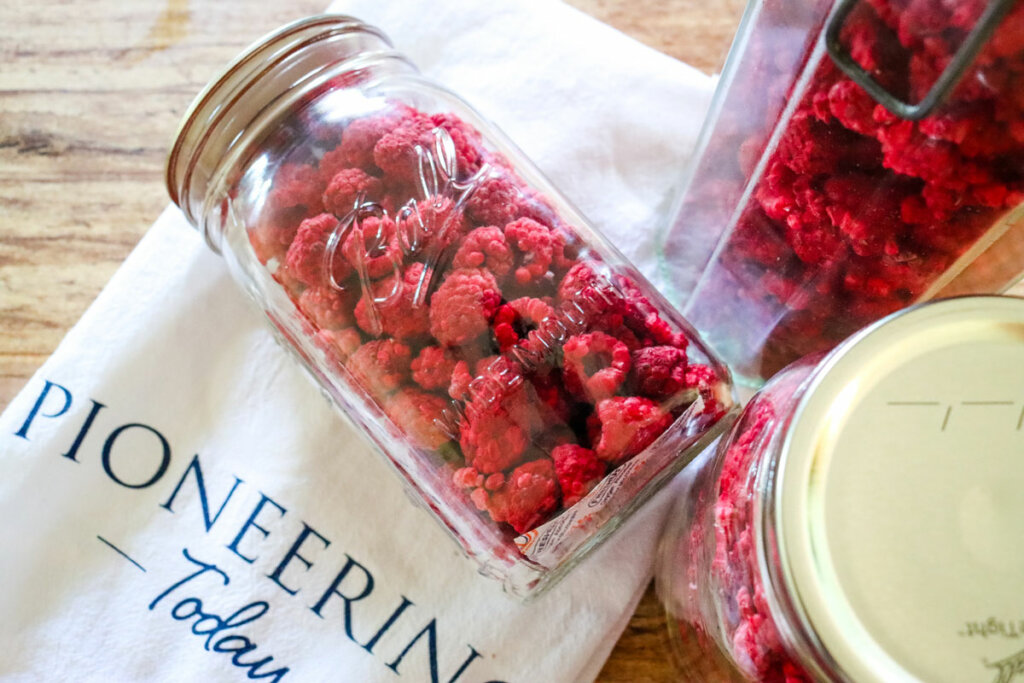
What is Freeze-Drying?
The way freeze-drying works is it uses a technique called sublimation. First, the food is frozen all the way down to -40 degrees F. At this temperature, all the moisture that’s in that food gets frozen in a vaporized form, then the vacuum mechanism kicks in and sucks all that moisture out. After that, it actually uses the same method as dehydrating to finish the freeze-drying process.
The end result is a product that retains over 97% of the vitamins and minerals of the fresh product and is shelf-stable for up to 20 years.
In my bit of experimentation, many methods of food preservation such as canning or dehydrating actually change the flavor of the food, which some people don’t enjoy. Freeze-dried food is very crunchy, almost like a chip and I personally think the flavors are intensified over the fresh food itself. I also love that freeze-dried food maintains the shape and size of the fresh food. So for us, freeze-drying has been a pleasant surprise.
Now let’s get into the different kinds of preservation methods for meat, eggs, and dairy…
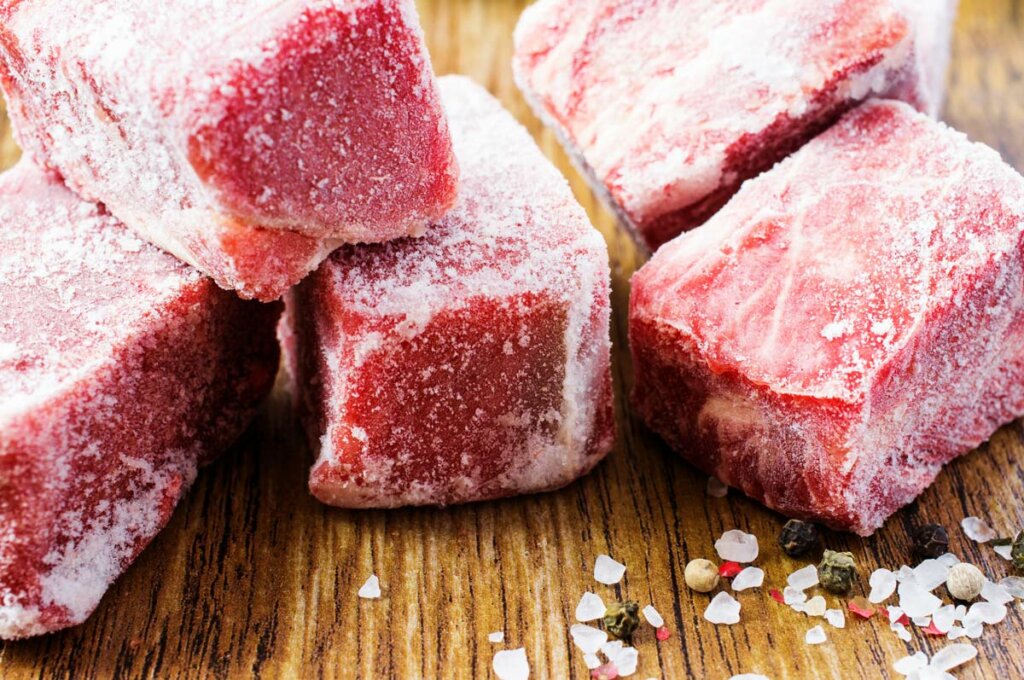
Preserving Meat
When we’re preserving our meat in either a pressure canner, dehydrator, or freezer dryer, it’s usually with lean cuts of meat. The reason for this is that fat goes rancid much faster than the actual meat. Fat can also inhibit sealing when pressure canning so it’s usually removed from things like homemade and home-canned broth.
You can freeze meat items with the fat, however, most of us are limited to a certain amount of freezer space. We have to save our freezer space for the 1/2 cow we get each year (read here for our favorite cuts of meat to get), the 25 chickens we butcher, the crab we catch ourselves for the year, and the whole pig we butcher every other year!
So freezing extra food, whether it’s cheese, eggs, or even milk, it’s just not the priority over our year’s worth of meat!
Furthermore, if you lose power, you’d better have a generator as a backup so you don’t lose all that food!
So what other methods of preserving meat will allow us to free up some freezer space?
Pressure Canning Meat
You can safely can meat using a pressure canner. If you’re in the Home Canning With Confidence Course, you know I have lessons that I’ve walked you through on how to pressure can your meat. You can pressure can all kinds of meat such as bone-in poultry, cubed beef, ground beef, and even sausage to name a few.
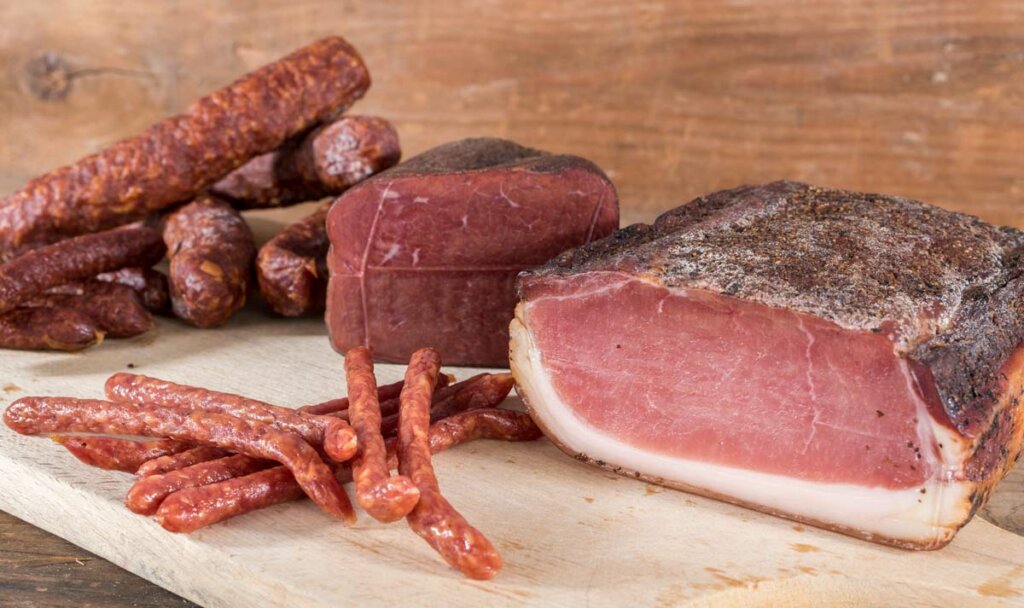
Curing Meat
Cured meat is an incredible option if you’re willing to read up on the best practices to follow. I have a post on how to dry cure meats you can read here.
I’ve also salt-cured ham in the past and that turns out incredibly good. These are longer processes, but they’re fantastic options.
Dehydrating Meat
If you’re using a regular dehydrator, most of the meat still has a relatively short shelf-life, and it’s best if refrigerated for long-term storage.
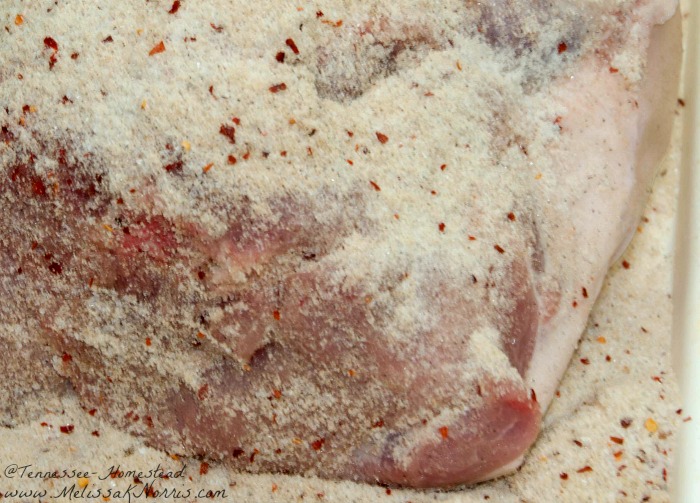
When freeze-drying meat you can store your meat at room temperature for up to 20 years! Now, I’m not guessing most of us will actually need to store our meat that long, but if you needed to, ya could!
The tip for freeze-drying meat is to freeze dry it fully cooked. That way, when you reconstitute it, it’s fully cooked and ready to eat.
The nice thing with freeze-dried meat is that you can’t add too much water back to it. It will only take up as much water as is needed to be back to its normal consistency.
This is something that can’t be safely done in a regular dehydrator.
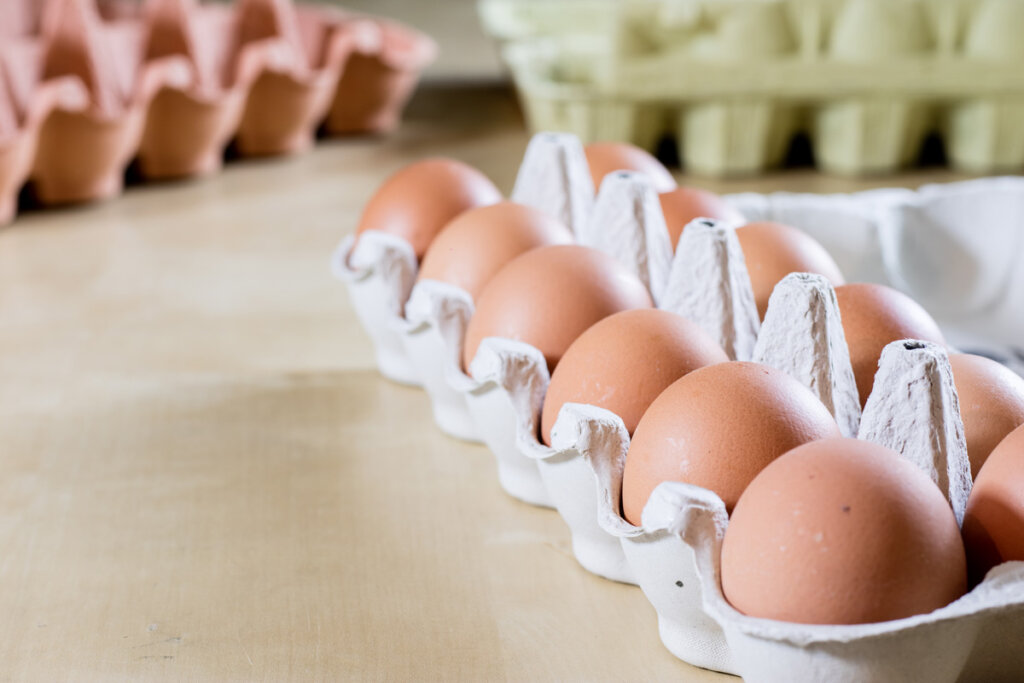
Preserving Eggs
For a more in-depth look at eggs, especially long-term preservation methods, check out the podcast I did on storing and preserving eggs with Lisa Steele (episode #310).
Cold Storage
But to recap, you can store unwashed eggs that still have the bloom on them in the refrigerator for months with no issues!
Freezing Eggs
You can freeze eggs by whipping the egg yolk and white together, then freezing. Frozen eggs are great for baking or using in recipes, but not necessarily to eat as scrambled eggs.
Liming eggs
Limed eggs are a great option for storing eggs for up to a year or more, however, this requires you to have a space where you can store them in a large 5-gallon bucket (or multiple buckets depending on how many eggs you’ll need for the year).
I haven’t gone this route because I don’t have the extra space where the temperatures stay at a constant temperature year-round unless I keep them in the middle of my living space!
Dehydrating Eggs
You can dehydrate eggs in their cooked form. But I’ve found they don’t taste that great, and the fact that they have to first be cooked limits their use for baking in the future.
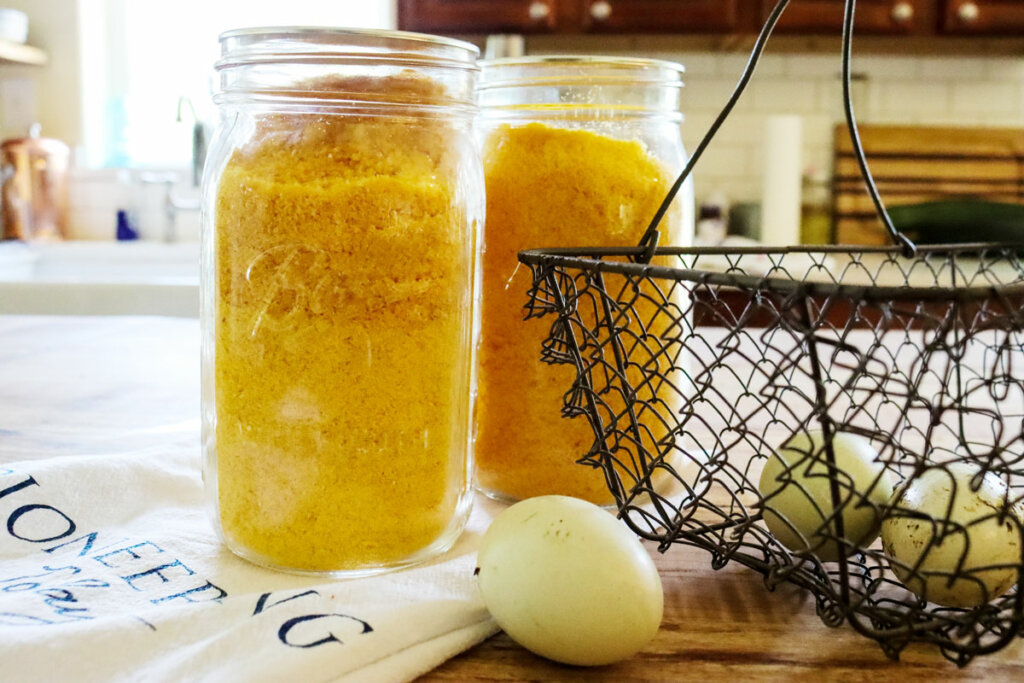
Freeze-Dried Eggs
My new favorite method for preserving eggs for long-term storage that are both able to be cooked and eaten “fresh”, or used in baking.
I can preserve 54 eggs in each freeze-dried batch which takes about one day. My hens are getting older so the above two 1-quart jars were 36 eggs. When we’re discussing the amount of space our preserved food takes up, this is by far the smallest amount of space (especially when you consider that’s 3 dozen eggs!).
The taste of freeze-dried eggs is also phenomenal. I did a blind taste test with my daughter and they won out over all the rest! Check out How to Preserve Eggs with a Freeze Dryer for Long Term Food Storage
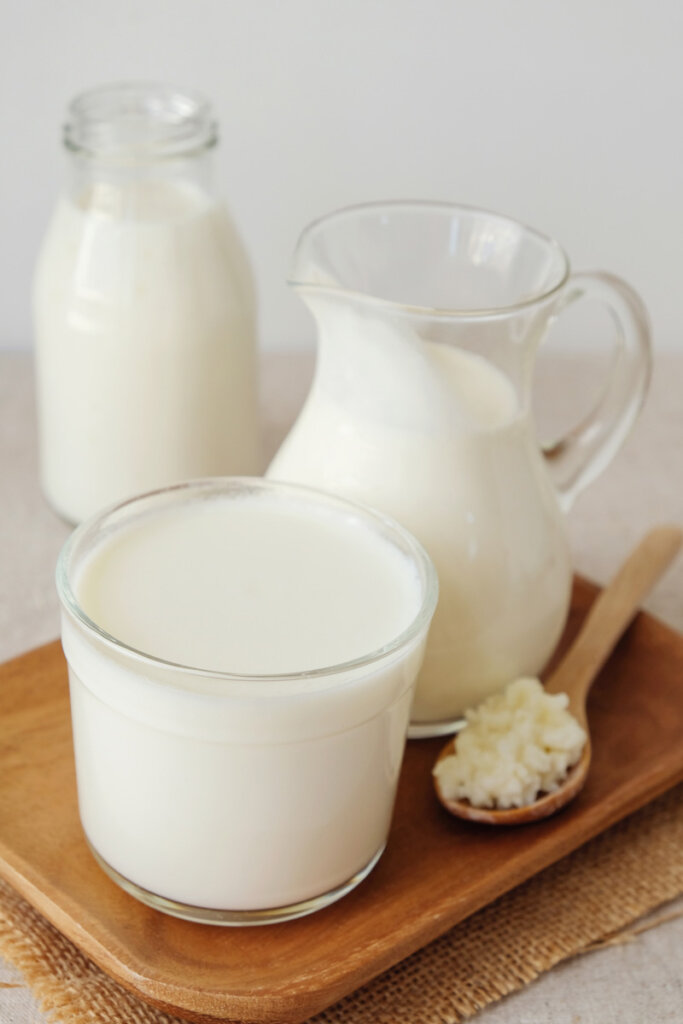
Preserving Milk
Since we are recently new dairy cow owners, it’s especially important to learn how to preserve the abundance she provides.
The first way you preserve your milk is by refrigeration. This is how the majority of us keep our milk lasting weeks instead of days.
Culturing
In the Pioneer days and for centuries before this, the best way to preserve milk was to ferment it.
This is a fantastic method that actually improves the health benefits in the milk and fills the end product with beneficial bacteria!
I have a traditionally prepared buttermilk recipe on the blog and a homemade yogurt recipe as well. But fermenting or culturing your milk will preserve it for varying amounts of time, depending on the product you turn it into.
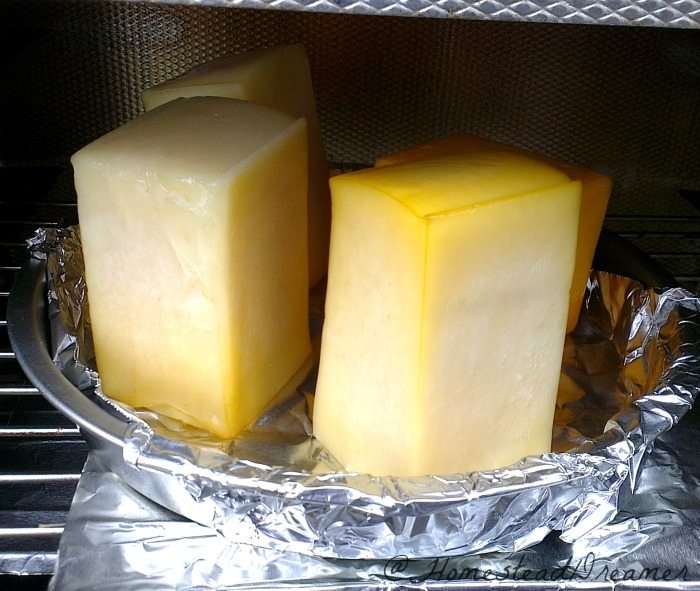
Cheese Making
Milk can be preserved longest as a hard cheese. You can also make cottage cheese, feta cheese, cream cheese, etc. I love soft cheeses but they just don’t last as long as hard cheeses.
Having a variety of methods to preserve your milk is best so you can keep it year long. Even after learning ancestral cheesemaking methods for better health and delicious products, you still need an area of your home where you can keep the cheeses at a cool temperature.
Check out natural cheese making, homemade marinated cheese balls and my tutorial for smoking hard cheeses.
Freezing Milk
You can freeze milk for long-term storage, but I’ve found that after a few months in the freezer the texture changes, and it becomes a bit grainy once defrosted as those fat globules don’t redistribute well into the milk.
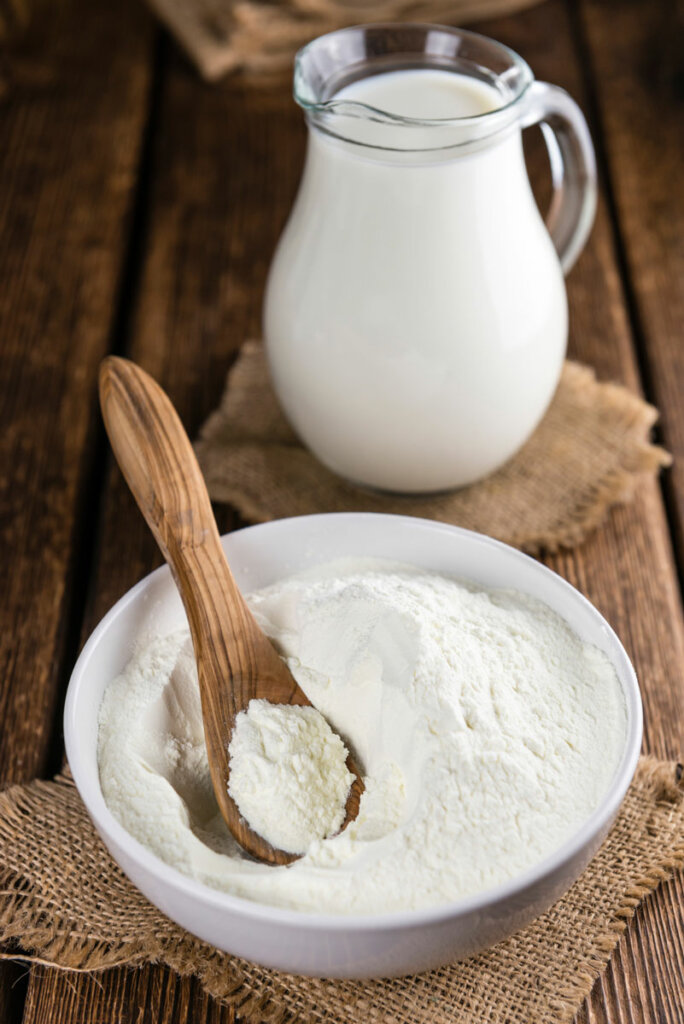
Freeze-Dried Milk
With my Harvest Right freeze-dryer, I’ll be freeze-drying our own milk and coffee for instant homemade versions. Here are some must-know freeze drying tips that my friend, Carolyn Thomas, shared with me.
Where to Get a Freeze Dryer
If you’re interested in buying a home freeze dryer, check out Harvest Right! I have the medium-sized unit.
Verse of the Week – Galatians 5:26
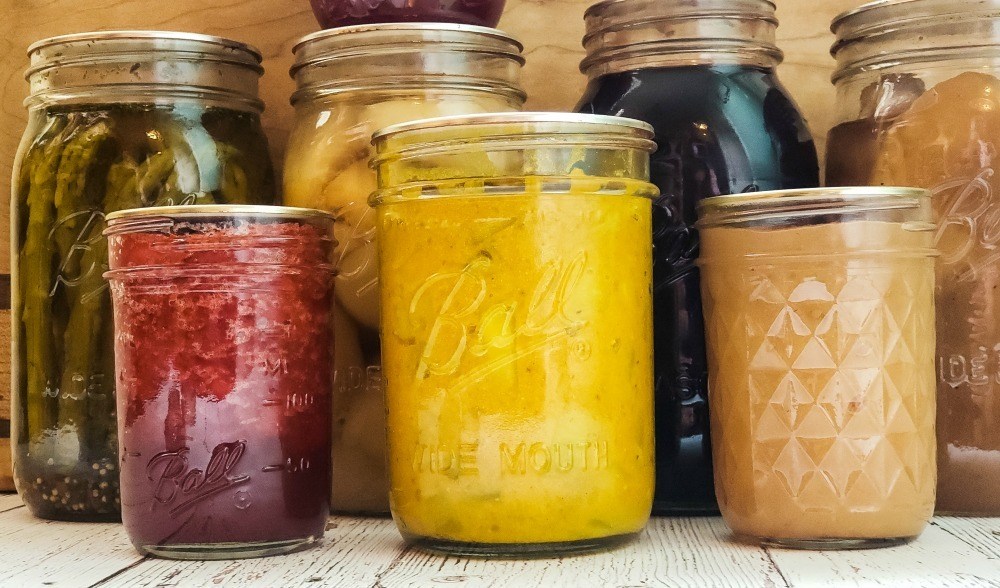
[fusebox_transcript]
More Articles You May Enjoy
- The Science of Home Food Preservation
- Tips for Home Food Preservation – Seasonal Preserving Each Month
- A Complete Guide to Home Food Preservation (What to do When You Can’t Find Canning Supplies)
- Home Food Preservation- Preserving Plan for a Year’s Worth of Food
- 9 Ways to Preserve Food at Home
- How to Store Home Canned Food Safely – Jar Stacking & Canning Rings
- 129+ Best Canning Recipes to Put Up This Year
- How Do You Know if a Canning Recipe is Safe
- How to Pick the Best Preserving Methods
- How to Convert Recipes for Canning + Safety Tips
- What is A2 Milk & What are the Benefits?
- 12 Ways to Preserve Apples at Home
- Leather Britches Green Beans (200-Year-Old Preservation Method)
- How to Cook Leather Britches Green Beans
- Cooking With Wild Game (So It Tastes Good!)
- How to Cook Rabbit
